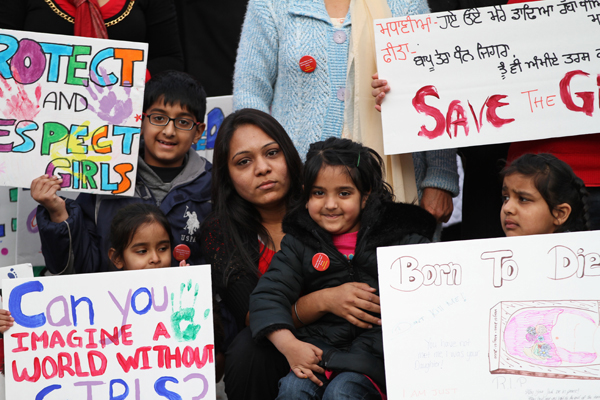Kwantlen students stand up for animals
April 12, 2011 by Matt Law · Leave a Comment
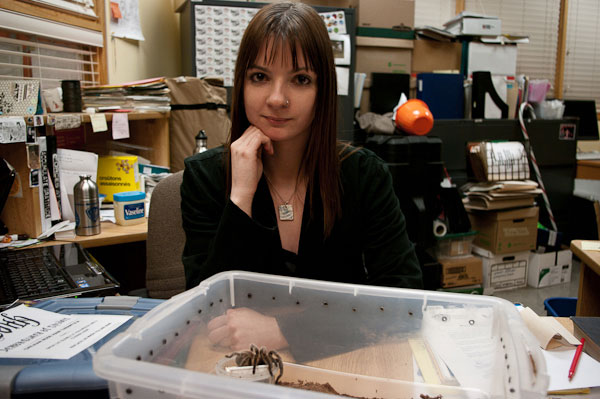
Kari Michaels, founder of the Kwantlen Animal Rights Collective, is fighting for animals big and small — even her Chilean Rose tarantula named Lolth. (Photo by Kyle Benning)
Students at Kwantlen Polytechnic University are standing up for the rights of animals, from eight-legged tarantulas to cud-chewing cows.
The Animal Rights Collective club was started in 2010 after founder Kari Michaels saw a need for a way to connect like-minded students. Her goal: bring attention to the mistreatment of all animals, big or small.
“I think a big thing is knowing there are people out there that think the same way, especially with animal rights,” said Michaels.
Michaels had always cared for animals but it wasn’t until she found out that she was allergic to dairy and eggs that she decided to take that next step in animal activism and become a vegan. This lifestyle change led her to lean a lot about how farm animals are treated.
“It was a very strong wake-up call to advocate for the better treatment of animals,” she said.
Her transition to a complete vegan has not been an easy one and the support of a group is what has helped keep her from cheating with her favourite foods, nachos being her latest indiscretion.
“I thought there must be people here who feel the same way but just don’t have a community, so part of it is community building, which I think is really important, not only to help with resources but it also helps with support,” said Michaels.
The Animal Rights Collective isn’t just for vegans. It’s for anyone who cares about the ethical treatment of animals.
“As long as you don’t think it’s okay to kick a puppy, you’re in,” Michaels said.
While Michaels’ focus is on the treatment of farm animals, the club brings attention to all animal rights issues, such as puppy and cat mills, as well as product testing on animals.
For Michaels, advocating for animal rights isn’t more important than any of the other serious issues facing the world.
“There are so many other issues in the world that are important, there are human rights, womens rights, but a lot of people don’t understand that when you care about animal rights it’s part of that scope, you’re just extending that scope of compassion to include non-human beings,” she said.
Michaels said it isn’t the goal of the club to force other students to change, but to promote thought and discussion. She also hopes to bring more vegan-friendly options to the Kwantlen campuses.
For more information on the Animal Rights Collective, contact the club by email
Selective feticide still a problem in Canada
April 5, 2011 by Matt Law · Leave a Comment
Members of the South Asian community are putting faith in a new generation to change how women are viewed in their culture.
On March 5, over 70 people, many of them youths, gathered at Kwantlen Polytechnic University’s Surrey campus to take part in the Global Walk for the Missing Girls and to bring awareness to the problem of female feticide and infanticide.
Prominent members of the South Asian community made passionate speeches about the problem and then led people in a walk around the campus.
The walk took place in five countries and 16 cities around the globe in conjunction with International Women’s Day.
In the last century, 50 million girls have been lost from India’s population and in the last two decades 10 million have been killed by their parents either before or after birth.
With the introduction of cheap and portable ultrasound equipment the problem has become much worse.
Dr. Pargat Singh Bhurji, a pediatrician in Surrey, said the main reason for feticide and infanticide is dowry, which is a gift of money or estate that the bride brings to her husband when they are married. Other societal issues, like rape, have also contributed to increases in abortions.
“Eventually you need a uterus to be born. You cannot be born in the ground like potatoes or up on the tree like apples,” said Bhurji. “We are destroying our own future in a sense.”
While there are laws in India prohibiting doctors from identifying the sex of a fetus, no one has ever been charged.
Most people think of selective feticide and infanticide as being a problem in other parts of the world, like India and China, however, it is a much broader issue.

Dr. Pargat Singh Bhurji, a pediatrician in Surrey, talks to reporters after the Global Walk for the Missing Girls on March 5. The problem of female feticide is not just in India but happens in Canada as well. (Photo by Jeffrey Yip)
“It’s not a regional problem, it’s everywhere,” said Garima Kaur, the event’s organizer and an international student at Kwantlen.
The issue of selective feticide reaches as far as Vancouver and Surrey where it is supposed to be illegal for doctors to identify the sex of a fetus before a certain stage in pregnancy.
“There are clinics across the border, there are clinics in Surrey who actually advertise about this. ‘If you want to know if it is a girl child or a boy child and want to abort it then come here,’” said Kaur.
Pawan Dhillon, a maternity doctor in Cloverdale, has seen the issues of gender inequality here in Canada.
“In my experience it’s not as blatant as what we see in India,” said Dhillon. “I have been in deliveries where after I’ve announced ‘It’s a baby girl,’ it’s been met with silence. It’s not a common occurrence, but it is still there and it’s something that we need rectify.”
This was the first year the event was held in B.C. and Kaur hopes that it will continue to grow in the coming years. Reaching youth is one of her main priorities.
“If you encourage the youth, if you educate them that ‘let’s put a stop to it’, because they are the ones who are going to be parents now and in the future,” she said. “I think the solution is just in educating them — changing their mindsets rather than changing people who’ve already lived their 40, 50 years of life.”
Kwantlen gets some wheels
April 5, 2011 by Matt Law · Leave a Comment
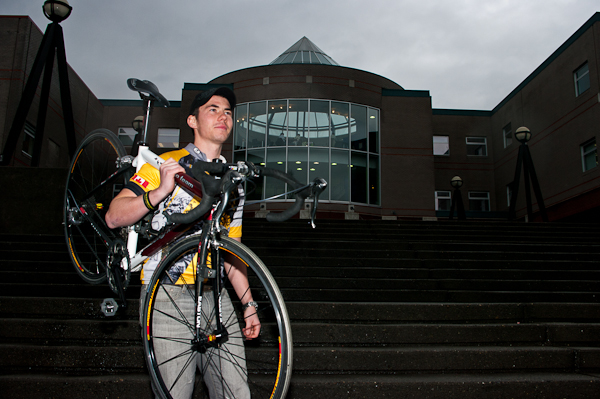
Stephan Struve, a journalism student at Kwantlen Polytechnic University, hopes to get more students riding bikes with his new cycling club “Hotwheels.” (Photo by Matt Law)
There is a new club rolling into Kwantlen; one with two wheels, spandex and shaved legs — well maybe not the spandex and shaved legs. The Hotwheels cycling club is Kwantlen’s newest addition and is gearing-up to get more students onto bikes.
Stephan Struve, a fourth-year journalism student and Hotwheels’ founder, created the club after he could not find one that met his interests in cycling and physical fitness.
“My idea was to get more students involved in cycling and to promote it as a lifestyle choice and also to balance the lifestyle of cramming sessions,” said Struve.
The idea for club was born out of Struve’s new-found passion for cycling, which he only took up in 2008.
“It became something that I was good at, and with my competitive nature, it drove me into seeing how far I could go. It became something I want to pursue as a competitive sport,” he said.
As he became more involved in cycling, he looked for new and bigger challenges, which led him to the Ride to Conquer Cancer. The thought of riding 300 km, from Vancouver to Seattle, in two days, was enough to get him hooked on the sport. And once he found out about the challenge of raising money for cancer, Struve had another reason to keep pedaling.
After completing the ride for two years in a row, Struve described crossing the finish line as involving a lot of tears.
“Emotionally it’s difficult to describe because you are a little overwhelmed by everything, but I would probably describe it as joy mixed in with sheer surprise,” he said.
Struve’s new challenge is to get more Kwantlen students involved in raising money to fight cancer by riding their bikes.
“I think that it is important that I pass on my experience,” he said. “It gives you a whole new outlook on the emotional effect and why people participate in the ride, besides the physical challenge.”
The Hotwheels club is meant for anyone interested in cycling, from beginners to seasoned vets. And Struve hopes that through the club, more people will become interested in the Ride to Conquer Cancer.
“I hope that the club will give people the opportunity to share that common passion of cycling,” said Struve. “Different bikes, different physiques and different goals but to give them that platform to meet with each other and hopefully motivate people to cycle more.”
The club currently has 15 members and Struve hopes it will continue to grow.
Beyond getting students involved in cycling the club plans to hold a cycle-thon and bake sale to raise money for the Ride to Conquer Cancer. Struve also hopes to run a bike safety and basic maintenance workshop for people involved in the club.
Joining the club free and members can participate in weekly rides and events planned for the future.
For more information on the club or to make a donation to the Hotwheels Ride to Conquer Cancer team, e-mail Struve
.
START hosts bake sale for Heart & Stroke
March 1, 2011 by Matt Law · Leave a Comment

START Volunteers (left to right) Naveen Zafar, Luke Arathoon and Sunita Sohi hope to raise $2,000 for the Heart & Stroke Foundation by holding a cupcake drive. Photo by Matt Law
Bring your toonies to Kwantlen campuses this week — START is hosting a cupcake bake sale to benefit the Heart & Stoke Foundation of BC & Yukon.
The cupcake sale starts Wednesday, March 2, in the rotunda on Richmond campus from 11 a.m.-4 p.m. and moves to the Surrey courtyard on March 3.
Cupcakes cost a minimum donation of $2 and proceeds go to supporting the KUSA START Volunteer Big Bike teams which will ride May, 20 at 4 p.m. and 5 p.m. at Central City in Surrey.
Cupcake sales have become a fairly common sight on Kwantlen campuses and have been used to raise money for everything from graduation events to breast cancer.
This is the first time the START program has run a sale benefiting the Heart & Stoke Foundation said Naveen Zafar, START’s volunteer mentor.
The START Volunteer program was established in 2010 with a goal of connecting Kwantlen students with their community. Zafar and several other volunteers had been involved with the Heart & Stroke Foundation in the past but had never organized anything through Kwantlen.
“The Heart & Stroke Foundation has nothing to do with the bake sale; we are just donating all of the money because we believe it’s a good cause,” said Zafar.
Many of the volunteers were interested in baked goods, so START purchased close to $195 worth of cupcakes from a bakery that uses all-natural ingredients. The Grassroots Cafe will also be donating hot chocolate and iced tea for the sale. START has a goal of raising $2,000 from the cupcake sale and other donations but Zafar believes they will be able to raise much more.
According to the Heart and Stroke Foundation, there are an estimated 70,000 heart attacks in Canada every year; that equals one every seven minutes. Over 16,000 people die as a result of heart attacks each year in Canada.
More on the START Volunteer program.
More on the Heart & Stroke Foundation of BC and Yukon.
Nursing students helping immigrant women
December 5, 2010 by Matt Law · Leave a Comment

(From left to right) Fourth-year nursing students Gillian Fantillo, Brianne Southcott, Krista Rohachuk-Smith and Kathryn Hull have worked to launch a new immigrant woman's clinic in Surrey as part of a school project. (Photo by Matt Law)
Nursing students in their fourth year at Kwantlen Polytechnic University are helping to lay the groundwork for a new women’s clinic in Surrey.
The goal of the clinic is to help educate immigrant women on sexual health and their rights in Canada.
“Basically, we are a link between the woman and primary health care,” said Krista Rohachuk-Smith, a nursing student at Kwantlen. “We do birth control counselling, [and providing information on] contraceptives, housing, abortion, domestic abuse is also something we do.”
The clinic started as a joint effort between the Progressive Intercultural Community Services (PICS) and Kwantlen instructor Dr. Balbir Gurm.
Students began working on the clinic in January 2010, paving the way for the current group of four students to continue their work and launch the program.
Funding has been tight for the start-up organization and they have received much of their material by donation. Office space and resources were provided by PICS and the Kwantlen Student Association has provided tampons and condoms free of charge.

The clinic offers information and education on womans sexual health, rights and abuse. (Photo by Matt Law)
“We’re hoping that once our grand opening happens and some of the local politicians come out and see, they might want to start offering funding for us,” said Rohachuk-Smith.
The clinic offers both anonymous consultation over the phone and email and in-person appointments and drop-in visits. And the clinic is free and confidential.
In many cultures, there are stigmas around women’s sexual health issues that make it hard for immigrants to seek help and advice. Abuse and lack of knowledge leave many women helpless.
“You hear a lot of stories about women who don’t know that rape exists within a marriage. You have a right to say no, you have a right to go on birth control, you have the right of the woman to decide how many children you want in Canada,” said Rohachuk-Smith.
In some cultures, women are not allowed to use birth control and often are refused access to it by family and physicians.
“The thing that we were most shocked about is hearing stories about women going to a doctor or going to a pharmacist to get treatment or birth control and having that pharmacist or doctor call their husband. That was the most shocking because according to their scope of practice it is supposed to be confidential and they don’t have the right to do that, but it happens,” said Gillian Fantillo, also a nursing student at Kwantlen.
The clinic has a number of resources to help women in these situations, including lists of pharmacies that are not safe to use, connections with the RCMP and legal groups.
The clinic held its grant opening at its office in Surrey last week. Office hours are Thursdays, 9 a.m.-3 p.m.
For more information on the clinic, email womens.clinic@live.ca, or call 604-596-7525, ext. 243.
Kwantlen artists trying to make a name for themselves
December 5, 2010 by Matt Law · Leave a Comment
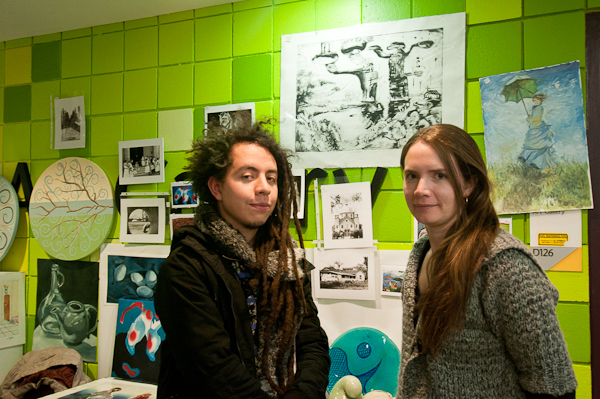
Andres Salaz (left) and Shelly Leroux man the Kwantlen Student Artist Collective's art sale last Wednesday. (Photo by Matt Law)
The Kwantlen Student Artist Collective has held its first art sale, last week on the Surrey campus, as a way to gain exposure for their group and raise funds for artists.
KSAC was started only two months ago in an attempt to make a name for students in Kwantlen’s Bachelor of Arts program.
“The whole thing is, we got sick of how apathetic everyone is in the fine arts department. So, we had the show last year in Cloverdale, it was okay, but we want more exposure,” said Andres Salaz, one of the founders of KSAC. “We want to be at the same level as Emily Carr now that we got the degree.”
Salaz began studying art at Kwantlen four years ago before switching to Emily Carr. After two years at Emily Carr, he returned to Kwantlen because he didn’t like the atmosphere.
“People were too snobby and cold. I remember I was in the photo room all the time and no one would talk to anybody and it was just like walking into a fridge,” he said
The goal of KSAC is to expose Kwantlen’s artists to the Vancouver art scene through shows and art exhibits.
“In art, all you need is exposure and be out there, and you have to make your own shows so the galleries get interested. That is why we started the collective, to raise money with the art sale and things like that,” said Salaz.
“Emily Carr gets it [exposure] because it has the name but no one knows about the bachelors in fine arts at Kwantlen. We just want to get the name out there.”
The Kwantlen Student Art Collective currently has 22 members and welcomes anyone to join.
Kwantlen students support fight against breast cancer
October 25, 2010 by Matt Law · Leave a Comment
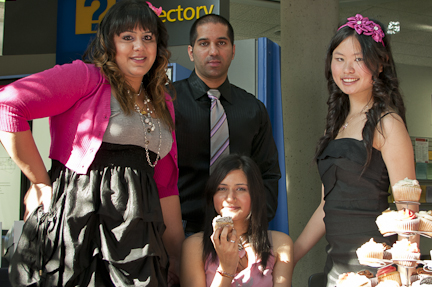
(Clockwise from left) Reena Bali, Harj Dhesi, Nicole Joe and Puja Basi sell cupcakes on Kwantlen’s Richmond campus last Tuesday in support of breast cancer awareness month. (Photo by Matt Law)
In support of breast cancer awareness month, the Kwantlen Student Association held a Breast Cancer Cupcake Bar last week.
This was the third year of the annual event, held on the Richmond, Langley and Surrey campuses, and it raised $877, all of which goes to the Canadian Breast Cancer Foundation.
“It’s been a lot more responsive than the last few years, and we were thinking maybe it’s just the way we’ve set up. We’ve grown with the event, made it a little bigger, a little fancier,” said Reena Bali, director of events and student life.

The third annual Breast Cancer Cupcake Bar raised $877 for the Canadian Breast Cancer Foundation. (Photo by Matt Law)
The recipe for the cupcakes sold on Richmond and Surrey campuses was donated by the local business Dolce Delights; the cupcakes were made by campus representative Nicole Joe.
“The ones from Langley, we bought from a local bakery called Frostings, only because it’s really hard to bake cupcakes for three days in a row,” said Bali. “In Langley, the cupcakes went really fast. We were done by 1:30, students and faculty were buying them like no tomorrow.”
The Canadian Breast Cancer Foundation estimates 23,200 women will be diagnosed with breast cancer in 2010, which is up 500 from 2009. Close to 950 of these cases will be women under 40.
Men are also affected by breast cancer. Estimates suggest 180 men will be diagnosed with the disease in 2010.
KSA’s Kwantlen yoga studio loses $6,000 in first year
October 25, 2010 by Matt Law · Leave a Comment
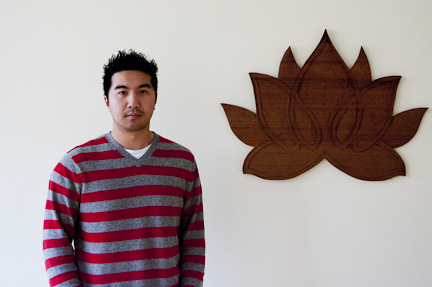
Eddie Lee, Health & Recreation Manager for the KSA, believes the new model for fitness classes on the Richmond campus will turn the budget around. (Photo by Matt Law)
The Blossoming Lotus yoga studio at Kwantlen’s Richmond campus took a financial hit during its first year of operation.
According to a June 24 budget update from the Kwantlen Student Association, the studio had accumulated a net loss of $6,855 while generating only $1,887 in revenue.
“We definitely took a loss this year; it was unanticipated. It was the first year of doing it, we’ve never really done fitness classes out here before. We were trying a couple of different models and it’s reflected in the losses,” said Eddie Lee, health & recreation manager of the Kwantlen Student Association.
Most of the expenses for the studio came from instructor fees which totalled $6,060. Other expenses included marketing and administrative costs, which came to $969, and general operating expenses (cleaning, signage, postage), which came to $1,713.
According to Lee, lack of student participation in the classes was a big factor.
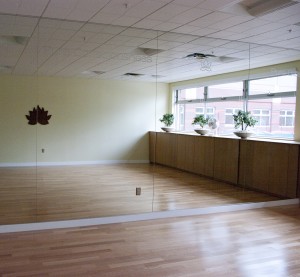
Lack of student participation was a major factor in the Blossoming Lotus’ first year losses (Photo by Matt Law)
“Students want to take classes but it interferes with their classes, so for that reason they can’t participate. But it’s not for a lack of interest,” Lee said.
“We’ve priced ourselves to be affordable to students, which means we’re typically lower than the community centres, the studios, the fitness clubs, things like that. We’re not here to profit off the students.”
The cost for individual classes is $25 for students on the health and dental plan and $35 for students who are not. Community centres in both Richmond and Surrey also offer drop in classes at costs ranging from $4.25 (with student discount) to $5.50.
To help mitigate losses, the KSA has created an online registration system using Paypal. This will enable courses to be run when there are enough students to fill them. The KSA has also changed some instructors and opened classes to the community to make them more cost effective.
“With the reduction in instructor fees and going to this online registration, we’ve definitely seen a growth in the numbers and attendance, which obviously combined with the reduced instructor fees are taking us closer to that break-even point.” said Lee.
The next budget will be released in January 2011 and Lee is positive things will have turned around.
“I’m confident in saying that the losses have been significantly reduced and we’re hoping to break even or come in with a small profit margin by next year.”
Food bank offers help for struggling students
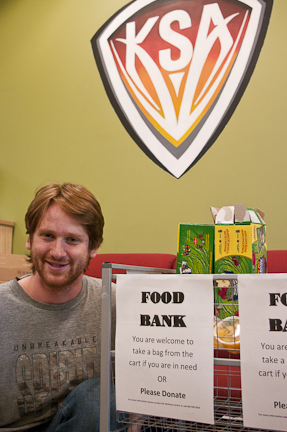
Nathan Griffiths, of the KUSA, explains that food donations for the student food bank are often so low the association has to purchase food so that there is enough. (Photo by Matt Law)
With increasing costs for students, Kwantlen University’s food bank is playing an increasingly important role.
In September, the jobless rate in B.C. rose 0.2 per cent according to B.C. Stats, which put the jobless rate at 7.5 per cent, 0.5 percent below the national average of eight per cent. Youth in B.C. (ages 15-24), face an even higher unemployment rate of 14.4 per cent.
“There is kind of an untold story and sad truth about student hunger. Students unfortunately are paying more in tuition than they ever have before and often earning less than they did before,” said Nathan Griffiths, marketing & communications coordinator for the Kwantlen University Student Association.
The KUSA has been running the current form of the food bank for roughly one year and offers discreet support for students in need.
“We look for any non-perishable food items and there’s drop-off and pick-up locations around campuses, generally next to the KUSA offices,” said Griffiths.
Students are free to drop off or pick up food from these locations as needed. It is an open system that anyone can make use of.
“As with any food bank, unfortunately the need outweighs the supply. So the KUSA, through the student health improvement program, buys additional food to ensure that there’s always food in the food basket,” Griffiths said.
The KUSA also offers a program for students who have a more serious need for financial assistance.
“We have an auxiliary program for students who need even more food. There are about a dozen students on this program, where we leave a larger basket in an undisclosed locker for them and they can pick it up if they need. That’s for if there is an identified serious problem,” said Griffiths
The counselling department will identify students who are in need of this support and connect them with the program.
“Nobody needs to know they are using the food bank program; it is completely anonymous,” said Griffiths.
Students need to move to avoid pains of sitting
October 12, 2010 by Matt Law · Leave a Comment
Proper posture is not something on the minds of most university students, but the way you’re sitting may be affecting you more than you think.
“Sitting is an issue in the population at large, and so what we’re seeing, progressively, is a decline in physical capability and a progressive increase in muscular tension,” said Dr. Michael Vipond, a chiropractor for 26 years.
“I think the biggest issue, especially if you’re a student in their 20s, is that you just don’t think about it being an issue because you’re bendable enough that you think it’s no big deal.”
When a person sits for an extended period of time, some muscle groups are both shortened and stretched, creating muscle imbalance and weakness. Over time, this can reduce mobility and cause lower back and neck pain
“The classic places you will see it when you’re sitting are in the hamstrings, the hip flexors, the deep hip flexors and the anterior muscles of the neck and the chest,” said Vipond. “When you slump [in a chair], you’re reversing the curve of your lumbar spine, so that puts abnormal stress on it.”
The perils of the laptop
Working on a laptop computer can also cause added stress to the neck and chest.
“If it’s a desktop, at least you have the opportunity to create decent ergonomics, but with a laptop, you’re either too high with your hands or too low and then you have to drop your head down to see it,” said Vipond.
Years of sitting in a poor position and slumping in your chair, can cause a type of injury classified as progressive micro-trauma, a chronic injury that builds up over time.
“It’s not something that you do in a couple of minutes or even an hour, but you do it over day after day after day. What magnifies the effects of the postural change is when you hit deadlines, exams, all the things where you’re adding additional muscular stress or tension or anxiety, and that just ramps up the muscle changes all over,” said Vipond.
According to Vipond, students should be moving around every half-hour or at least changing their position while they sit. Performing a range of motion exercises to help combat imbalances created by sitting can be a big help, too.
“Range of motion is usually the key thing, so for your neck, that’s forward and back, turning left and right and tilting left and right. Even in your chair, you can do those same motions through your trunk, bending forward and tilting and turning.”
Vipond also suggests rolling up a towel or sweater and placing it between the small of your back and the chair to maintain the natural curve of your spine.
“Just getting out and moving around is one of the key things, and if they [students] aren’t exercising, at the very least what they should be doing is some stretching exercises to try and counter act those changes,” said Vipond.


